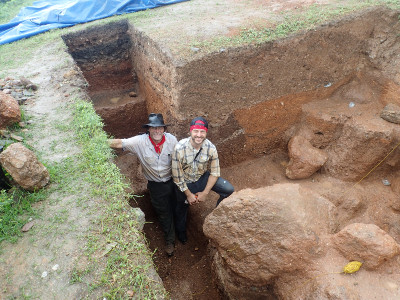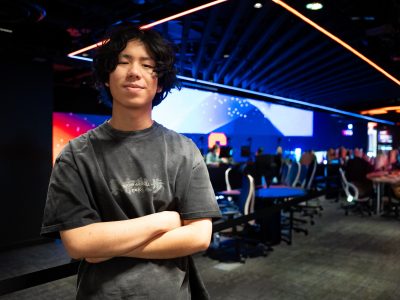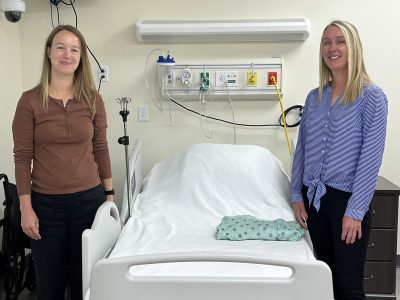‘The First Scramble for Africa’: Maxwell Professor Unearths England’s First Outpost
Back in 2019, Syracuse University archaeologist Christopher DeCorse was part of a team that made an unexpected discovery during fieldwork in coastal Ghana. While excavating the ruins of the 17th-century Dutch Fort Amsterdam, the researchers from Syracuse, the University of Rochester and the University of Ghana unearthed trade materials suggesting they may have found the location of an older English fort, Kormantine—England’s first outpost in Africa, built in 1631, and one of the earliest that sent enslaved Africans to the new colonies in the Americas.
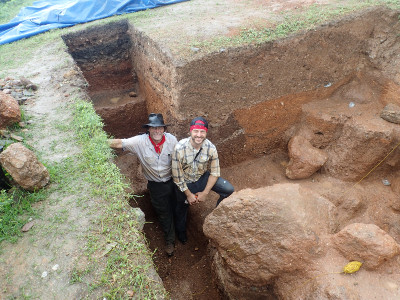
Discovering a site of such historical import would be a major development, but the pandemic delayed further investigation until the summer of 2023, when DeCorse returned to Ghana to lead an extensive excavation. DeCorse, Distinguished Professor and chair of the Maxwell School’s Department of Anthropology, was supported by a $21,000 CUSE grant and an award from the National Endowment for the Humanities (NEH) topping $125,000.
Joining DeCorse’s project were several Maxwell School anthropology students and alumni, including Samuel Amartey G’15 (M.A.) G’21 (Ph.D.), a Ghanaian national and currently a lecturer at the University of Ghana, Legon, who served as the project field director; Sean Reid G’22 (Ph.D.), a research associate and lecturer at the University of Virginia; and doctoral candidate Matthew O’Leary.
The initial results were disappointing when the crew began to excavate for further evidence of the English fort this past June: they found more 17th-century artifacts, like ceramics and tobacco pipes, but mingled with plastics and other materials from 20th-century restoration projects.
Then Omokolade Omigbule, a Nigerian graduate student at the University of Virginia, dug a little deeper. “Suddenly he got down to a level with a very clear sizeable wall, almost three feet across, running diagonally across the room, and there was a clearly intact red clay floor,” DeCorse recalls. “We knew immediately: we have the wall of a fort that’s on a dramatically different orientation from the existing ruin. Although I believed traces of the fort would be present, the discovery of the massive, earlier wall was a huge surprise.”
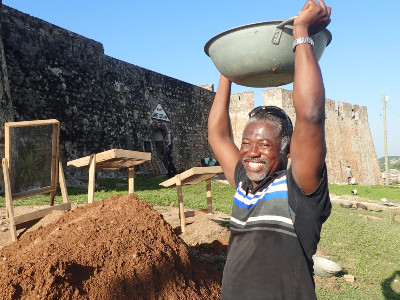
Word of the breakthrough spread quickly, prompting a visit from BBC News and inquiries from other international media outlets. As the excavation continued, they found more and more clues to Kormantine’s long-buried past. “What we essentially uncovered,” says DeCorse, “were things that encapsulate the entire early history of this fort.”
Outpost of an Empire
Kormantine’s history involved numerous transformations as it grew from a small trading lodge into more substantial outpost, and a new community of Africans, attracted by trade opportunities, established the adjacent town of Abandze.
The original outpost burned down in 1640 and the English replaced it with a strengthened stone fort. These remarkable findings illuminate a critical period in Atlantic history. “This is really the first scramble for Africa,” explains DeCorse. “At this point in the 17th century, European nations are scrambling for colonies and for outposts in Africa, trying to take advantage of the trade that the Portuguese had been dominating. And it’s at this time on the Gold Coast when slaves replace gold as the major trade item.”
The Kormantine site provides important keys to better understanding this era, and the cultural and economic interactions between Africans and Europeans through an early outpost of empire. While there are documentary references to the fort, descriptions of its location and construction are very limited, DeCorse says.
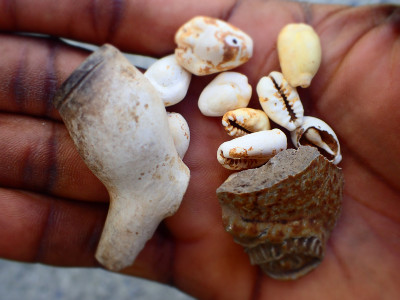
Over the summer, DeCorse and the team uncovered several artifacts that offer insights into early 17th-century life at the fort. One example are small glass medicine bottles. “These medicine bottles and ointment jars would have been from trying to treat people with diseases that they were unfamiliar with,” says DeCorse.
While media coverage of the Kormantine discovery focused on the English fortification and its role in the slave trade, Amartey, the Ph.D. alumnus who was DeCorse’s student, notes that the African artifacts from the site are equally enlightening.
“We found several quern grinders, stone axes and ceramics,” he says. “They shed light on local practices and interactions between the British and local people. These items were likely used for food procurement and processing to support the fort’s garrison and crew members. To me, these materials show the complexities of European-African interactions.”
Refining Chronology
One of DeCorse’s favorite finds from across his career as an archaeologist is a locally made tobacco pipe from Kormantine that incorporates a stem from a European pipe. “It indicates this sort of cultural syncretism—a combining of European and African elements,” he says.
DeCorse has worked in West Africa for more than 40 years, focusing on transformations in Africa during the period of the Atlantic trade. Thirty years ago, he established the Central Region Project as a hub for archaeological work in Ghana. To date, the project has encompassed work on hundreds of archaeological sites and yielded eight dissertations at the University alone.
The work at Kormantine is far from complete. At the end of July, the team backfilled the site to protect it from the elements and other disturbances to the fragile structures until work can resume next summer.
Many of those who worked with DeCorse over the summer plan to continue with the project. “We will continue analysis and excavations next summer, and probably in 2025,” says Amartey.
Reid, DeCorse’s former student now at the University of Virginia, notes that some deposits uncovered this past summer may indicate yet a deeper level of history: they found what appear to be ground stone celts, called nyame akuma, that predate the fort and may represent a pre-Atlantic component of the site.
In the future, people across the globe will be able to virtually visit Fort Amsterdam and the excavations. DeCorse is a collaborator on a separate NEH-funded project, “Black Past Lives Matter: Digital Kormantin,” directed by the University of Rochester’s Michael Jarvis, that is creating a virtual tour of the site to be offered online.
Along with the ongoing work on the Kormantine site, DeCorse plans to publish short reports on the findings, to be followed by more detailed publications once excavations are complete. He is also fundraising for the project—the NEH grant requires $20,000 in matching funds from outside sources to unlock the full amount.
And in late September, DeCorse returned to Ghana—not to dig, but to share the story of the remarkable Kormantine discoveries with a film crew and reporters from CBS.
This story was written to by Jeffrey Pepper Rodgers. To read more, visit the Maxwell School website.
